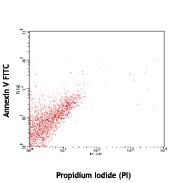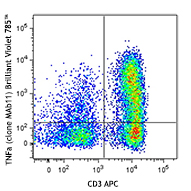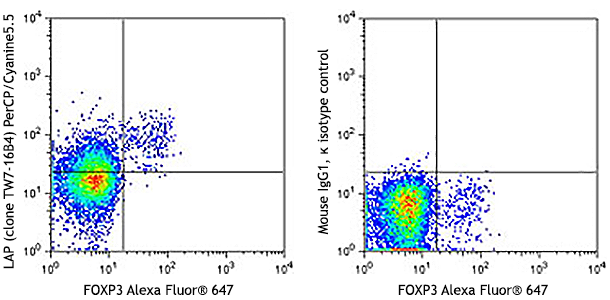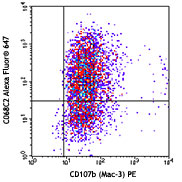- Clone
- TW4-2F8 (See other available formats)
- Regulatory Status
- RUO
- Other Names
- Latency Associated Peptide (LAP), Transforming growth factor beta 1 (TGF-b1), TGFB1, DPD1
- Isotype
- Mouse IgG1, κ
- Ave. Rating
- Submit a Review
- Product Citations
- publications

-

Human peripheral blood mononuclear cells were stimulated with CD3, CD28, and recombinant human IL-2 for 24-hours; cells were surface stained with LAP (clone TW4-2F8) Alexa Fluor® 647 (top) or mouse IgG1, κ Alexa Fluor® 647 isotype control (bottom), followed by intracelluar staining with FOXP3 PE (gated on CD4+ lymphocytes). -

| Cat # | Size | Price | Quantity Check Availability | Save | ||
|---|---|---|---|---|---|---|
TGF-β1 (transforming growth factor β1) is a multifunctional cytokine which regulates cellular proliferation and differentiation. It is ubiquitously expressed by many types of cells. Platelets express high level of TGF-β. TGF-β is synthesized as a large protein precursor and then secreted as a complex of TGF-β and LAP (latency-associated peptide), in which LAP noncovalently associates with the dimeric mature TGF-β to prevent its activity. TGF-β requires activation before it binds to its receptors and exerts functions. It has been reported that LAP-TGF-β binds to the integrins αvβ1, αvβ6, αvβ8, and α8β1 through RGD domain. TGF-β plays important roles in control proliferation and differentiation of epithelial cells, endothelial cells, fibroblasts, neurons, osteoclasts, and osteoblasts. TGF-β is believed to be important in the regulation of the development of Treg, Th17, and Th9 cells. A recent study has shown that LAP is an activated Treg surface marker.
Product DetailsProduct Details
- Verified Reactivity
- Human
- Antibody Type
- Monoclonal
- Host Species
- Mouse
- Immunogen
- LAP (TGF-β)
- Application
-
FC - Quality tested
- Recommended Usage
-
Each lot of this antibody is quality control tested by immunofluorescent staining with flow cytometric analysis. For flow cytometric staining, the suggested use of this reagent is 5 µl per million cells in 100 µl staining volume or 5 µl per 100 µl of whole blood.
* Alexa Fluor® 647 has a maximum emission of 668 nm when it is excited at 633 nm / 635 nm.
Alexa Fluor® and Pacific Blue™ are trademarks of Life Technologies Corporation.
View full statement regarding label licenses - Excitation Laser
-
Red Laser (633 nm)
Antigen Details
- Structure
- About 400 amino acids, N-terminal signal peptide is required for secretion from a cell, a pro-region (LAP) and C-terminal region that becomes the mature TGF-β molecule following its release from the pro-region by proteolytic cleavage.
- Distribution
-
Ubiquitously expressed by many kinds of cells
- Function
- Multifunctional cytokine, regulates cells proliferation, and differentiation
- Ligand/Receptor
- TGF-βRI, -RII, -RIII, CD105, LTBP, integrins
- Cell Type
- B cells, Dendritic cells, Tregs
- Biology Area
- Apoptosis/Tumor Suppressors/Cell Death, Cell Biology, Immunology, Neuroinflammation, Neuroscience, Signal Transduction
- Molecular Family
- Cytokines/Chemokines, Growth Factors
- Antigen References
-
1. Yi JJ, et al. 2010. Cell 142:144.
2. Tran DQ, et al. 2009. Blood 113:5125.
3. Lu M, et al. 2002. J. Cell. Sci. 115:4641.
4. Khalil N. 1999. Microbes Infect. 1:1255. - Gene ID
- 7040 View all products for this Gene ID
- Specificity (DOES NOT SHOW ON TDS):
- LAP
- Specificity Alt (DOES NOT SHOW ON TDS):
- LAP
- App Abbreviation (DOES NOT SHOW ON TDS):
- FC
- Hidden Names (DOES NOT SHOW ON TDS):
- TGFB,TGF-beta,TGF b1,TGF-b1,TGF beta 1,TGFbeta,TGFb1,TGF-b,TGF-β1
- UniProt
- View information about LAP on UniProt.org
Related FAQs
Customers Also Purchased
Compare Data Across All Formats
This data display is provided for general comparisons between formats.
Your actual data may vary due to variations in samples, target cells, instruments and their settings, staining conditions, and other factors.
If you need assistance with selecting the best format contact our expert technical support team.

 Login / Register
Login / Register 
















Follow Us